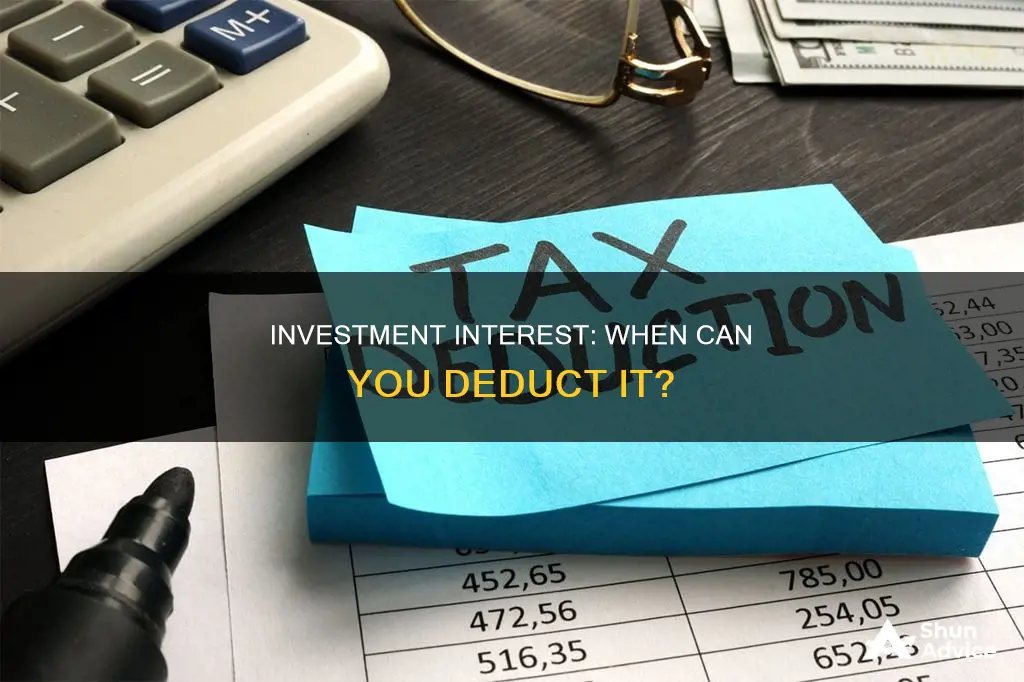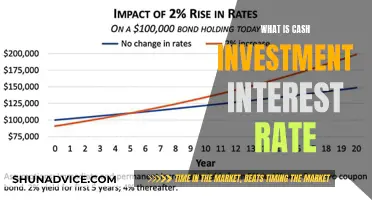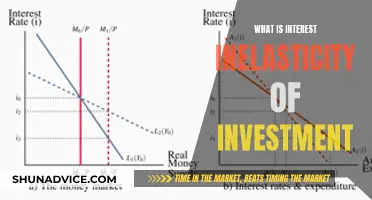
Investment interest is deductible when it is incurred on money borrowed to invest. However, there are restrictions on how much you can deduct and which investments qualify for the deduction. For example, you can only deduct a proportional amount of the interest you pay if you use only part of the borrowed money for investments. You also cannot deduct more in investment interest than you earned in investment income in the same year.
| Characteristics | Values |
|---|---|
| Type of interest | Investment interest |
| Type of interest that is deductible | Interest on money borrowed to buy property that will produce investment income |
| Type of property that can be bought with borrowed money | Property that will produce interest, dividends, annuities, royalties or gain-generating property |
| Type of property that cannot be bought with borrowed money | Property that produces nontaxable income, such as tax-exempt bonds |
| Amount of interest that can be deducted | Limited to the amount of taxable investment income earned in the same year |
| Amount of interest that cannot be deducted | More than what was earned in investment income in that year |
| Type of interest that does not qualify for the investment interest deduction | Interest incurred from a 'passive activity' investment |
What You'll Learn
- Investment interest expenses are limited to the amount of taxable investment income earned in the same year
- You can't deduct more in investment interest than you earned in investment income
- Interest incurred from a 'passive activity' investment generally does not qualify for the investment interest deduction
- You can't deduct interest when the property you buy produces nontaxable income, such as tax-exempt bonds
- Investment property includes an interest involving the conduct of a trade or business that is not considered a passive activity

Investment interest expenses are limited to the amount of taxable investment income earned in the same year
The deduction for investment interest expenses is limited to the amount of taxable investment income earned in the same year. In other words, you cannot deduct more in investment interest than you earned in investment income in any given year. However, you can carry forward your "disallowed" investment interest to the next year.
Investment interest can only be claimed by itemizing deductions on Schedule A and filing Form 4952. Interest incurred from a 'passive activity' investment generally does not qualify for the investment interest deduction. The federal tax code includes a number of incentives to encourage investment, including the deduction for investment interest expenses.
In general, you can deduct interest paid on money you borrow to invest, although there are restrictions on how much you can deduct and which investments actually qualify you for the deduction. For example, you can only deduct a proportional amount of the interest you pay if you use only part of the borrowed money for investments. You can also deduct interest on money borrowed to buy property that will produce investment income—interest, dividends, annuities or royalties—or that you expect to appreciate in value, allowing you to sell it at a gain in the future. However, you can't deduct interest when the property you buy produces nontaxable income, such as tax-exempt bonds.
Understanding Compound Interest: Smart Investment Choices
You may want to see also

You can't deduct more in investment interest than you earned in investment income
In general, you can deduct interest paid on money you borrow to invest, although there are restrictions on how much you can deduct and which investments actually qualify you for the deduction. For example, interest incurred from a 'passive activity' investment generally does not qualify for the investment interest deduction.
You can only deduct a proportional amount of the interest you pay if you use only part of the borrowed money for investments. The deduction applies to interest on money borrowed to buy property that will produce investment income—interest, dividends, annuities or royalties—or that you expect to appreciate in value, allowing you to sell it at a gain in the future.
However, you can carry forward your "disallowed" investment interest to the next year.
Making Daily Interest: 1% Returns on Your Investments
You may want to see also

Interest incurred from a 'passive activity' investment generally does not qualify for the investment interest deduction
Investment interest expenses are deductible, but only up to the amount of taxable investment income earned in the same year. You can deduct interest paid on money you borrow to invest, but there are restrictions on how much you can deduct and which investments qualify you for the deduction. For example, you can't deduct interest when the property you buy produces nontaxable income, such as tax-exempt bonds.
Interest incurred from a passive activity investment generally does not qualify for the investment interest deduction. Passive activity investments include any property producing interest, dividends, annuities, royalties, and gain-generating property other than that used in a trade or business activity or passive activity.
For example, if you have $3,000 in margin interest but net investment income of only $1,000, you can only deduct the $1,000 in investment interest in the current year. The IRS does allow you to carry forward the disallowed deduction into future years, however.
The interest on a loan taken to buy a house to rent out is not deductible as investment interest but can usually be deducted as an expense item for operating costs.
Interest Rate Changes: Impact on Planned Investments
You may want to see also

You can't deduct interest when the property you buy produces nontaxable income, such as tax-exempt bonds
You can only deduct investment interest expenses up to the amount of taxable investment income earned in the same year. In other words, you can't deduct more in investment interest than you earned in investment income.
Investment interest can be claimed by itemizing deductions on Schedule A and filing Form 4952. However, you can't deduct interest when the property you buy produces nontaxable income, such as tax-exempt bonds. This is because the interest on that loan is not deductible as mortgage interest. Instead, it is considered investment interest, which is only deductible when the property produces taxable income.
For example, if you have $3,000 in margin interest but net investment income of only $1,000, you can only deduct the $1,000 in investment interest in the current year. The IRS does allow you to carry forward the disallowed deduction into future years, however.
Property held for investment includes any property producing interest, dividends, annuities, royalties, and gain-generating property other than that used in a trade or business activity or passive activity.
Investing Amidst Fed Interest Rate Hikes: Where to Put Your Money
You may want to see also

Investment property includes an interest involving the conduct of a trade or business that is not considered a passive activity
The deduction for investment interest expenses is limited to the amount of taxable investment income earned in the same year. You cannot deduct more in investment interest than you earned in investment income in any year. However, you can carry forward your "disallowed" investment interest to the next year. Investment interest can only be claimed by itemizing deductions on Schedule A and filing Form 4952. Interest incurred from a 'passive activity' investment generally does not qualify for the investment interest deduction.
Understanding Investment Interest Expense: What Investors Need to Know
You may want to see also
Frequently asked questions
Investment interest is the interest on a loan taken out to buy property that will produce investment income, such as interest, dividends, annuities or royalties.
Investment interest can be deducted from your taxable investment income earned in the same year. You can only deduct the amount of interest that corresponds to the amount of investment income.
You can claim investment interest by itemising deductions on Schedule A and filing Form 4952.
Interest from a passive activity investment generally does not qualify for the investment interest deduction. You also cannot deduct interest when the property you buy produces nontaxable income, such as tax-exempt bonds.







